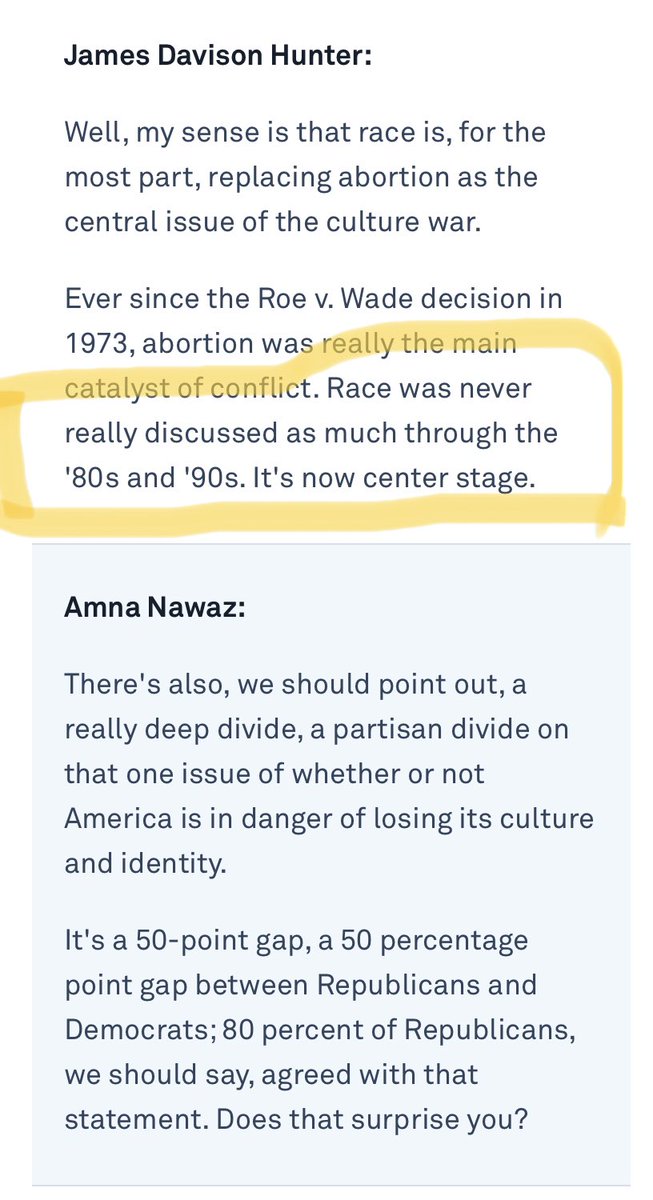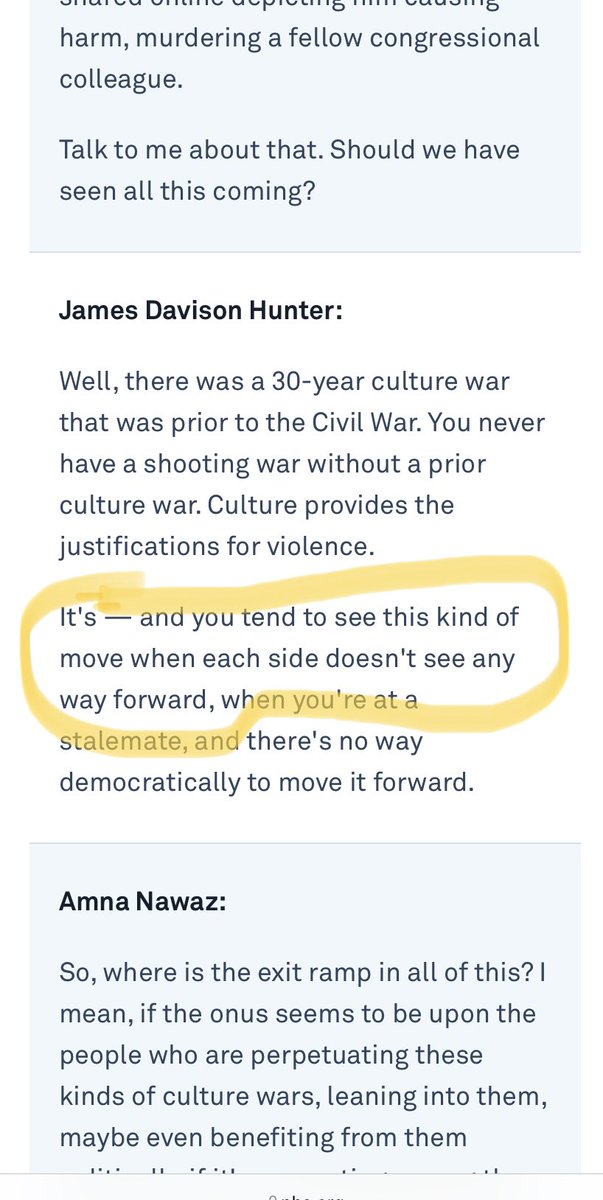
A distorting #polarization framework and the never-ending search for “both sides” equivalence produce seriously misleading political analysis.
Let’s dive into an especially egregious example: A PBS @NewsHour interview with sociologist James Davison Hunter. Brace yourselves. 1/
Let’s dive into an especially egregious example: A PBS @NewsHour interview with sociologist James Davison Hunter. Brace yourselves. 1/
https://twitter.com/NewsHour/status/1464074180660539427
Right off the bat, JDH claims that the culture wars have turned into “class culture wars”: America split into two camps, a progressive elite vs the conservative middle and working classes. This, however, completely obscures the actual fault lines of the political conflict. 2/ 

This idea of “class culture wars” misrepresents the political coalitions on either side of the conflict. First of all, it ignores how enormously important a wealthy reactionary elite is in funding and defining the conservative political project. 3/
Secondly, it’s oblivious to the fact that Democrats are consistently supported by a majority of working-class voters, and the further down we go in terms of socio-economic status, the clearer it becomes that people who really struggle financially/economically prefer Democrats. 4/
Most importantly, JDH ignores the central organizing principle of American politics – race! From his remarks, you would never know and could never understand why socially conservative Black people overwhelmingly align with those progressive “elites” and vote Democratic. 5/
So, we are off to a great start – and it gets worse as the interview turns to the role of race in the “culture wars”: “Race was never really discussed as much through the ‘80s and ‘90s,” James Davison Hunter proclaims.
That’s just an astonishing thing to say. 6/
That’s just an astonishing thing to say. 6/

I understand, of course, that this is in line with how JDH has always defined the “culture wars,” focusing on issues such as abortion, gun rights, or homosexuality. But it’s precisely the problem that he doesn’t reflect on how race intersected and shaped all these conflicts. 7/
More importantly, this interview is ostensibly about the defining political conflict in America, about “polarization in the U.S. and how to lower the temperature,” and in that context, telling a story of how race was supposedly not a big issue until recently seems way off. 8/
At the very least, telling the story of “polarization” – or, to be more precise: a growing partisan divide – in America without acknowledging that race has always been absolutely central to that process is utterly misleading. 9/
Party realignment after the 1960s was predominantly a process of partisan sorting along racial attitudes. It was not a coincidence that “polarization” started when one party decided to break with the white elite consensus and supported the civil rights legislation of the 60s. 10/
https://twitter.com/tzimmer_history/status/1462788980404064259
You know who’s been very clear about the centrality of race in the partisan realignment? The Republican Party. Yes, the Southern Strategy wasn’t entirely about capitalizing on racial resentment – but there was never a moment when race wasn’t at the core of it. 11/
https://twitter.com/madebyhistory/status/1154781864575623169
Again, I get that JDH has specific issues in mind when he says “culture wars.” But discussing political conflicts over gender, gun rights, or religion without grappling with how they have intersected with and have been shaped by race and racism very much distorts the picture. 12/
The Culture Wars were never just a struggle over whether the polity should be defined by Christian patriarchal values or ordered based on pluralistic, progressive ideas: It’s always been a conflict between a *white* Christian patriarchal ideology and *multiracial* pluralism. 13/
And claiming that the central political conflicts that drove the partisan divide in the final third of the twentieth century had nothing much to do with race is just utterly misleading. Such a de-racialized / sanitized tale of the “culture wars” simply doesn’t hold up. 14/
Finally, we come to the heart of the matter – which, for Hunter, is polarization. The interviewer actually brings up the massive differences between the two sides, citing that Republicans are the ones fearing that “America is in danger of losing its culture and identity.” 15/
But Hunter is unperturbed: “There's a sense now that each side sees the other as an existential threat, and that intensifies our public discourse.”
Ah yes, each side, #BothSides, equally subsumed by “fear,” as he further explains.
But wait, it gets worse. 16/
Ah yes, each side, #BothSides, equally subsumed by “fear,” as he further explains.
But wait, it gets worse. 16/

The segment turns to the question of violence. The interviewer brings up January 6 and Paul Gosar fantasizing about killing a prominent Democratic politician. Hunter’s response: “you tend to see this kind of move when each side doesn't see any way forward.”
Each. Side. 17/
Each. Side. 17/

The journalist now wants to know how we get out of this mess. Hunter doesn’t say – but he wants to make sure that we really understand how “both sides” are to blame: “I think that there is a sense on both sides of just deep exhaustion…” 18/ 

“…that we're no longer part of a shared project called America, and that — and even reason or facts, each side has their own reasons and their own facts.”
Might one side be, perhaps, slightly more reasonable and factual than the other? James Davison Hunter doesn’t care. 19/
Might one side be, perhaps, slightly more reasonable and factual than the other? James Davison Hunter doesn’t care. 19/

As analysis of America’s past and present, this is utterly inadequate. It’s a short interview – but still, American democracy is on the brink, Republicans are determined to erect one-party minority rule in the states, fascism is spreading… None of that even comes up. 20/
What makes this bad – in such a telling way – is not just the fact that it’s analytically inadequate, but that it is actively misleading, completely obscuring the nature of the political conflict. That’s what a heavy dose of polarization narrative plus #BothSides-ism will do. 21/
I suggest, however, that the analytical inadequacy is not a bug, but a feature – it is precisely the fact that all the talk about polarization and “both sides” obscures rather than illuminates the actual problem that makes it attractive politically. 22/
Politically, there is nothing contentious in what James Davison Hunter says: Polarization is bad, both sides are to blame, oh, these radical partisans on either side, unwilling to come together… It’s the least controversial take on U.S. politics, which is exactly the point. 23/
Part of the problem is, I suspect, that much like journalists, academic observers also get rewarded for being “nonpartisan,” and so the political discourse incentivizes analysts to signal “neutrality” by blaming #BothSides. 24/
The #polarization framework is very useful under such circumstances, providing a way to lament major problems in American politics without addressing the fact that the major threat to American democracy is a radicalizing Right. 25/
The interview, I think, is best understood not as an attempt at providing analysis, but as a manifestation of a specific ideological lens and a suggestion of how to formulate a lament that blames nobody or, more precisely, everybody equally and thereby signals “neutrality.” 26/
For academics and journalists, the job should be to describe, assess, and interpret politics as objectively, accurately, and adequately as possible. Under current circumstances, that task is very much in conflict with established ideas of “neutrality” and “nonpartisanship.” 27/
I really wish journalists would look for “experts” who are willing and able to give them more than this tired old “Oh, we’re so divided and polarized!” song.
I understand it’s a way to make sure nobody gets in trouble; but it does distort and mislead, and that’s a problem. /end
I understand it’s a way to make sure nobody gets in trouble; but it does distort and mislead, and that’s a problem. /end
• • •
Missing some Tweet in this thread? You can try to
force a refresh



